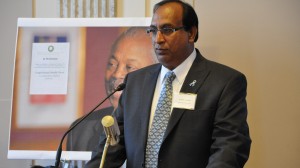
Babu Tekwani, principal scientist and professor of pharmacology in the University of Mississippi School of Pharmacy's National Center for Natural Products Research, addresses the U.S. Senate Working Group on Malaria about his research to fnd new anitmalarial drugs.
OXFORD, Miss. – Two scientists from the University of Mississippi recently spoke at the U.S. Capitol about the university’s scientific and technological advances in the field of malaria research.
“Malaria research is important because it causes close to 1 million deaths every year,” said Babu Tekwani, principal scientist and professor of pharmacology for the UM School of Pharmacy’s National Center for Natural Products Research. “Half of the globe is under the risk of getting exposed to malaria.”
The research, which has been conducted for more than 20 years on the university campus, is a multidisciplinary approach. The main goal is to make advances towards developing new antimalarial drugs.
“Our work has opened the way for developing safer drugs that kill the liver stages and the blood transmission stages of the parasite,” said Larry Walker, NCNPR director. “These forms are hard to kill.”
A second objective of the research is to improve primaquine, an existing drug used to treat malaria. For more than 50 years, primaquine has been the only drug available for the treatment and prevention of a relapsing form of malaria. However, the drug causes serious side effects in individuals who have a certain enzyme deficiency. This is a common genetic disorder in many parts of the world.
Walker and Tekwani presented their most recent findings to the U.S. Senate Working Group on Malaria, Congressional Caucus on Malaria & Neglected Tropical Diseases and other groups at the Russell Senate Office Building in D.C. on April 25, World Malaria Day. Malaria No More, a nonprofit agency determined to help the world reach the global goal of near zero malaria deaths by 2015, organized the meeting.
UM researchers were invited to the capitol along with those from 20 other prestigious institutions, including Johns Hopkins and Harvard University.
“All of these groups were selected simply on the basis of their strong malaria drug and vaccine research programs,” Walker said. “It was an opportunity to, first, highlight the research programs for congressional staff and other government and advocacy groups; and, second, to let these research programs interact and explore further collaborations.”
At the capitol, the university was recognized for its partnership with the U.S. Army. Because malaria poses a threat to servicemen and women when stationed in disease-endemic countries, the U.S. Department of Defense provided UM with a grant to support the research.
“Our troops are sent into countries where malaria is prevalent, so it is important that we make an effort to further our research into these antimalarial drugs,” Tekwani said.
U.S. Sen. Roger Wicker (R-Miss.), who is also co-chair of the Senate Working Group on Malaria, recognized the university’s presence and contributions to the fight against the disease.
“I am really impressed at the support that malaria research has in the U.S. government,” Tekwani said. “Even though here in the 21st century, malaria generally does not occur in the U.S., our citizens generally are concerned about global health. Any disease that is curable but is still killing 1 million people warrants our national attention.”
For more information on research programs at NCNPR, visit http://www.pharmacy.olemiss.edu/ncnpr/. For more information on Malaria No More, visit http://www.malarianomore.org/.